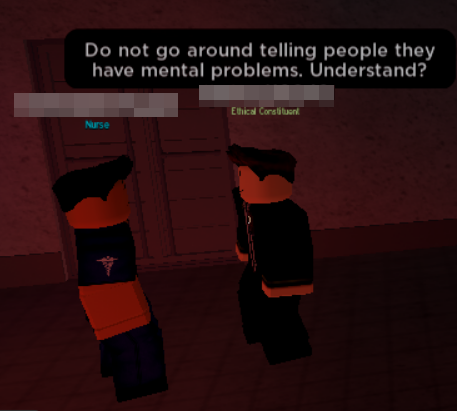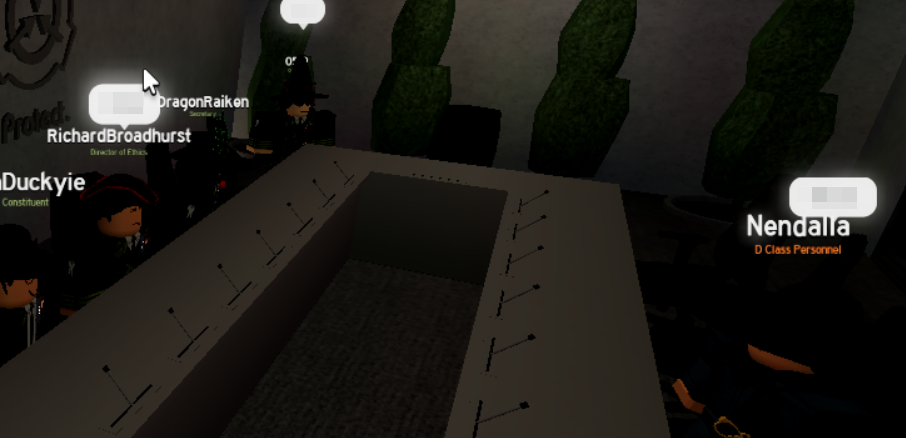Legal System (CreepySins)
A legal system is the system in which a foundation creates and enforces their rules. In CreepySins SCPF, the legislative authority is mainly seated with the O5 Council. Executive authority mainly resides with the Ethics Committee and Internal Security Department.
Legislation
The legislative system was reformed on the September 7th, 2024 with the introduction of the Administrative Department through the corresponding policy[1] and founding document[2]. It has introduced two new legislative organs, though only one is a fully fledged one. The Board of Directors was introduced as a true legislative organ, composed of eleven department directors. They are able to introduce motions and vote on them. Though, passed motions must receive approval from the O5 Council to be formall inducted into foundation law, or receive a veto to formally end the legislative case of the motion. The Executive Committee was created as a advisory committee to the Board of Directors, with no true abilities given.
The Office of the Administrator and the Office of the Overseer Council each hold the ability to issue Executive Orders. Executive Orders are pieces of legislature used to issue a specific action, or to create, amend or repent laws. Executive Orders are recorded on the Legislative Records Database. They are taken into effect through signature of the issuing office holder, and are active until repented by one of the two authorised offices. Examples of Executive Orders include legislation to bar Executives from being part of a hostile GOI, orders to create select committees to discuss possible projects, the creation or deletion of new offices, as well as amnesties.
Legislative Classes
The foundation has three legislative documents. The foundation framework is the main legislative document, with the other ones gaining their status through the contents of the framework. The framework is divided into the “Information”, “Getting Started”, “Foundation Policy”, “Executive Policy” and “Council Policy” sections. The former two are generally used for informational purposes. Foundation-, Executive- and Council policy are binding to their target groups. Enforcement bodies of the foundation do not prosecute by the framework, but instead prosecute by clauses of the Foundation Law Book, which is its criminal code. The Foundation Law Book, as its criminal code, provides enforcement bodies with these regulations. The Law Book is generally divided into “General Information”, “Ethical Violations” and “Intelligence Violations”.
The “General Information” section provides enforcement bodies with general information as to how violations are dealt with, along with principle clauses. The Clauses section features four clauses, along with other miscellaneous regulations[3]:
- Supremacy Clause, determining that the foundation framework and foundation law book are the two superior legislative documents of the foundation. Regulations of departments fall out of effect if in conflict with either of these documents. The superiority between the framework and law book is not regulated.
- Ex Post Facto Clause, prohibiting the prosecution of actions that have been outlawed after the action has already concluded, and that amended laws can not be applied to acts occurring before the amendment was enacted. Instead, the law in its old version is to be applied.
- Grandfather Clause, stating that an old law may not be applied to prosecute an action if there is a newer version of the law, or a different younger law taking effect in the situation. This prohibits enforcement bodies from using outdated laws or traditional rules to prosecute personnel.
- Double Jeopardy Clause, allowing each violation to only be prosecuted and punished once, regardless whether the sentence is later appealed or not. This introduces the concept of “prosecutive waste”, saying that the sole attempt of prosecuting a case may be wasted through misconduct. This does not apply to prosecution by enforcement bodies in connection with internal prosecution by department management.
Further, the clauses and regulations make accomplices liable to the same extent as the main violator. Moreover, it creates the jurisdictions of the Internal Monitoring & Enforcement Division and Iota-10, and determines the liability of Studio Staff. It also allows prosecutors to ban Level-0 personnel on-site if they are visibly trolling.
“Ethical Violations” are further divided into violations of minor, moderate and severe intensity. Violations are interdictions, meaning outlawed acts in the foundation. Violating one of these laws may result in prosecution and punishment. Violations are coded in the format VO §X.Y, where X is the subclass of the violation, and Y the violation number. Violations are enumerated in their subclasses.
| Paragraphs | Class | Jurisdiction[4] | Punishments[5] | Notes |
|---|---|---|---|---|
| §§ 1.0–1.2 | Minor, Ethical | Ethics Committee* | Formal Warning, up to 4 days** Class-E | Violations committed on the Security Department or Mobile Task Forces team on-site are prosecuted by the Internal Monitoring & Enforcement Division (for SD) and the Iota-10 Task Force (for MTF). |
| §§ 2.0-2.8 | Moderate, Ethical | up to 7 days** Class-E*** | ||
| §§ 3.0-3.5 | Severe, Ethical | up to 9 days** or permanent Class-E | ||
| §§ 4.0-4.5; 4.7-4.9 | Intelligence | Internal Security Department | Decided by enforcement body, no public legislative restrictions available | |
| § 4.6 | Intelligence Agency | |||
| § 4.10 | Studio, Intelligence | Intelligence Agency,
Senior Developers, Cyber and Asset Security Division | ||
| Asterisks:
* The Internal Security Department takes jurisdiction if committed in tandem with a violation of their natural jurisdiction ** With possible 33% extension *** Violations of VO § 2.1.2 (Bigotry) may be punished with up to thirty days Class-E. | ||||
The Code of Ethics is officially the third legislative document, but is the lowest in legal hierarchy. The Code of Ethics outlines the rights of departments and when their abilities may be used. While authorities do not officially prosecute violations by the Code of Ethics, it is used in conjunction with the Law Book. Clauses from the Law Book serve as the charge, and the contents of the Code of Ethics serve as justification. These clauses are not officially used during prosecution.
Enforcement
The two main enforcement bodies are the Ethics Committee and the Internal Security Department, with the Intelligence Agency, the O5 Council and Senior Developers mostly playing a side role. The Ethics Committee investigates the incident, and then votes internally on a punishment. The processes of the Internal Security Department are unknown to the public. The Ethics Committee is generally bound to the framework when giving out punishments, but is allowed to increase the sentence by up to 33%, or decrease the sentence up to 100%. The result is rounded up to determine the sentence.
After a rogue incident with Overlord172, the O5 Council has introduced the Removal Policy. This forces enforcement bodies to go through multiple steps when issuing Class-E sentences to executives, preventing further rogue incidents. Enforcement bodies typically use Class-Es as punishments, which is equal to a temporary suspension or permanent exclusion from employment by the foundation. For minor violations, enforcement bodies utilise Formal Warnings. Formal Warnings do not have any weight by their own as they are not logged. This allows enforcement bodies to punish a violation without suspending the user. The Internal Security Department may utilise Domestic Security Threat Protocols ("DST Protocol") in cooperation with the Administrator or the Overseer Head if a person represents danger to the foundations integrity.
Enforcement bodies are expected to investigate violations upon gaining knowledge of it having happened. Though mostly, enforcement bodies only get active if one of their members has actively witnessed the incident, or the incident is reported through official channels to them. If the violation happened with the presence of a member of an enforcement body, verbal warnings are given with the official prosecutive processes only beginning after the second iteration of the violation.
Judiciary
The first instance of the judiciary lies with the enforcement bodies. The second instance, appeals, depend on the issuing authority[6]. Class-Es may be appealed by the Ethics Committee, Internal Security Department, the O5 Council, the Intelligence Agency and the Cyber and Asset Security Division. Usually, Class-Es are appealed by the O5 Council. Seekers may contact an O5 with their appeal requets alongside an appeal plea. The O5 Council vote upon the message, and a Class-E is appealed with a simple majority. Though not intended naturally, any O5 Councillor may appeal a Class-E on their behalf with the approval of another councillor, bypassing the vote[7]. This s usually not done.
The Ethics Committee is intended by law to appeal Class-E sentences through an Appellate Board. While this was done in the past, the procedures was disbanded. The framework allows the Ethics Committee to appeal Class-E sentences whose evidence has not been classified "INTEL" or above. Appeals by the Ethics Committee may be revoked with a simple majority council vote, though there is no timeframe in which the revoke must happen. Class-Es issued by the Internal Security Department are appealed by the Director of Internal Security if the Class-E has not been requested by the Office of Internal Security. The Office of Internal Security must be informated at any appeal process[8]. Class-Es issued by the Intelligence Agency are appealed by the Director of Intelligence. Appeals by the Cyber and Asset Security Division are appealed by either the Director of Foreign Relations or the Director of Intelligence, depending on the nature of the case. Appealed permanent Class-Es will enter a probationary phase for 6 months, with any other incident warranting another permanent Class-E being automatically upgraded to an unappealable DST warrant.
The O5 Council is the second appellate instance, if it was not the first instance already.
Pardons, Amnesties
The foundation's legal system does not feature pardons or amnesties in the general sense. The punishment can not be voided without the verdict, appealing a punishment appeals the verdict and removes the incident from the Class-E record. Enforcement bodies have the abilites to pardon, such as the Director of Ethics. These pardons however are handed out before the punitive process is finished. Amnesties are not usually happening, with the only amnesty being the Executive Order #006, issued by CreepySins. This appealed most permanent Class-Es issued prior to 2022.
History
With the creation of the Administrative Department, reforms to the Framework were promised. A Class-E reform was to be created in a select committee by the O5 Head. This proposal was then submitted to the Ethics Committee and Internal Security Department for review and feedback. Further details of this reform remain classified, though it is expected to bring significant changes to the judiciary.
References
- ↑ Administrative Department on Framework
- ↑ Administrative Department via council bulletin on Discord
- ↑ Clauses & Class-E Regulations on Law Book
- ↑ Enforcement Body Jurisdiction on Framework
- ↑ Class-E Durations on Law Book
- ↑ Filing of Appeals on Framework
- ↑ Processes of the Council on Framework
- ↑ Executive Policies on Framework


